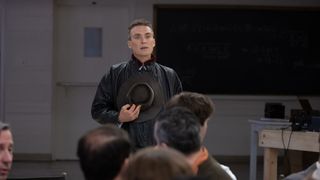Why Oppenheimer is our pick for the best film of 2023
Christopher Nolan’s thrilling biopic came out on top in a strong year featuring Barbie, Killers of the Flower Moon and Across the Spider-Verse

'They don’t make them like this anymore' is a cliche, but it’s an appropriate one when it comes to the films of Christopher Nolan. The writer-director has topped Total Film’s end of year poll on more than one previous occasion, but even by his own challenging standards – his films often break the mould narratively, and move at a pace that demands the audience cling on and keep up – Oppenheimer was looking like a harder sell. The hefty running time. The use of black-and-white. The focus on an extremely cerebral and conflicted historical figure, whose contribution to science and the world is one of the most unsettling creations ever unleashed, even to this day.
While films like this are often critically acclaimed, it’s been a long time since they’ve been box-office staples. This type of material tends to be the preserve of TV miniseries these days. But with this bold offering, Nolan not only made a superb film, he also proved that serious adult filmmaking (this was his first R/15 rated film since Insomnia) could draw in cinema crowds in huge numbers. Oppenheimer is a worthy film of the year on its own terms, but that fact it redefined what we can think of as blockbuster material makes its win all the sweeter. Heavyweight drama and auditorium-packing event cinema do not need to be mutually exclusive.
- Total Film's best movies of 2023 list in full
The world is not prepared

Take a look at the highest-grossing films of recent years, and it’s clear that franchise films have been packing punters in. In 2019 – before Covid massively disrupted the theatrical business – a record nine films grossed more than $1bn at the worldwide box office. All nine were either sequels or based on existing properties. Oppenheimer dared to think differently. With all the clout accumulated over his career, Nolan bet big on a complex drama that asks tough questions and leaves audiences with existential crises.
Of course, this being a Nolan film, there were a few givens. You expect an intricate narrative structure that plays with time and subjectivity. You expect practical effects, real-world settings and a commitment to large-format film that demands to be projected onto the biggest screens. And with Oppenheimer came the pioneering use of supersized black-and-white. Those elements cranked up the must-see factor, but looking at the subject matter, it still didn’t feel like an obvious mainstream summer movie, given the competition it was up against: returning outings for Mission: Impossible and Indiana Jones, and of course Barbie.
There’s no doubt that the Barbenheimer effect gave Oppenheimer a boost - the excitement around these two unexpected and diametrically opposed offerings being released on the same day, created a genuine phenomenon around this unexpected double bill. But, equally, there’s no way that Oppenheimer could’ve reached the heights it did without genuinely engaging audiences on its own terms, reframing their expectations about what classifies as an essential big-screen release.
You’re not just self important, you’re actually important

Right at the centre of Oppenheimer, carrying us the movie on his shoulders, and almost entirely from his perspective, is the title character. J. Robert Oppenheimer – described by Nolan as "like it or not… the most important person who ever lived" – is as conflicted and contradictory a character as the director has ever dealt with. So of course, a great deal of the film’s success comes down to Cillian Murphy. Having appeared in five previous Nolan pictures, here he took the lead role and truly delivered, disappearing into the role with a Daniel Day-Lewis-like transparency. Popular from a career of terrific performances, from 28 Days Later to his long run as Tommy Shelby in TV’s Peaky Blinders, part of the appeal was to see him in a career-best show-stopper.
But also adding to the event-movie status was the incredibly supporting cast, no doubt lured by the opportunity to work with Nolan. In the heftier supporting roles there’s Emily Blunt as Robert’s troubled wife, Kitty, Robert Downey Jr. as the Machiavellian Lewis Strauss, and Matt Damon as General Leslie Groves, the no-nonsense director of the Manhattan Project. All three are superb, but the entire supporting cast is packed with Oscar winners, characters actors and standout scene-stealers, including Florence Pugh, Alden Ehrenreich, Rami Malek, Gary Oldman, David Dastmalchian, Benny Safdie, Tom Conti, James Remar, and many more. The depth and breadth of the supporting cast really amplifies the significance of the film, and the events that are being depicted. You really feel that this is a remarkable moment in human history.
Sign up to the GamesRadar+ Newsletter
Weekly digests, tales from the communities you love, and more
Can you hear the music?

And it wasn’t just Oppenheimer’s in front of camera talent firing on all cylinders. Nolan marshalled returning collaborators to masterful effect. Ludwig Göransson’s sublime score sells Oppie’s genius, the tension of the Trinity Test countdown and the apocalyptic Pandora’s box that the test’s success opens, and it does so while retaining a unity and consistency across varied styles and influences. Jennifer Lame had another editing job to rival Tenet’s inverted timelines, weaving together Oppenheimer’s dual ‘Fission’/’Fusion’ threads and flashbacks within flashbacks. Hoyte van Hoytema’s photography knew when to be microscopically intimate and overwhelmingly vast, whether in colour or monochrome. The combined efforts of special effects supervisor Scott R. Fisher and visual effects supervisor rendered Oppenheimer’s work and imaginings gloriously tactile.
Put simply, this was filmmaking that rose to the demands of the material on every level. Cinema that held you rapt visually, aurally, emotionally, intellectually. This is the reason you leave the house, head to a hushed auditorium to experience a story on the biggest possible scale, in terms of visuals, sound, ideas. This is what the big-screen experience is made for.
For more, check out Total Film's list of the 25 best TV shows of 2023 and read our cover feature on Oppenheimer in full.

I'm the Editor at Total Film magazine, overseeing the running of the mag, and generally obsessing over all things Nolan, Kubrick and Pixar. Over the past decade I've worked in various roles for TF online and in print, including at GamesRadar+, and you can often hear me nattering on the Inside Total Film podcast. Bucket-list-ticking career highlights have included reporting from the set of Tenet and Avengers: Infinity War, as well as covering Comic-Con, TIFF and the Sundance Film Festival.
Most Popular



